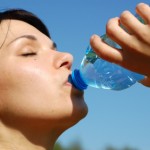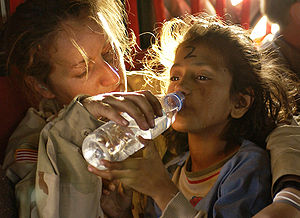 We all need water. Water helps hydrate our tissues and flushes our kidneys. We are 85% water and we need to replace water lost through urine, stools, sweat and breathing. Water even carries qi, via hydronium ions, so you want to drink enough if you are feeling lethargic.
We all need water. Water helps hydrate our tissues and flushes our kidneys. We are 85% water and we need to replace water lost through urine, stools, sweat and breathing. Water even carries qi, via hydronium ions, so you want to drink enough if you are feeling lethargic.
But there are many myths about water consumption:
- There is no evidence that we need eight 8 oz. glasses of water a day. This myth started when the Food and Nutrition Board of the National Research Council recommended approximately “1 milliliter of water for each calorie of food,” which would amount to roughly two to two-and-a-half quarts per day (64 to 80 ounces). Although in its next sentence, the Board stated “most of this quantity is contained in prepared foods,” that last sentence is virtually never quoted.
- You do not need to drink before you get thirsty. Evolution did not select for a water deficit. Your thirst is your body’s mechanism for determining how much water you need to drink. We have a well-balanced osmoregulatory system that maintains water balance through the antidiuretic hormone and thirst.
- Contrary to popular opinion our water needs do not have to come from pure water. We can get our water needs from foods or other liquids. In fact in Chinese medicine, eating watermelon is a cure for the disease known as Summerheat, because it replenishes fluids and electrolytes. ( Prior to air conditioning, there were riots in Beijing when watermelon trucks could not make their way into the city!)
- That said, water is a wonderful beverage which is cooling, hydrating and non-caloric. We need to value pure sources, preferably not from sources trucked across the world or the country. Fill your stainless steel or glass bottle and sip from it all day.
- Water can either hydrate your tissues or flush your kidneys. To hydrate yourself, drink no more than one half cup at a time. Drinking more triggers your urinary reflex. It helps to sip from a water bottle, slowly over time. On the other hand if you are detoxifying and need to flush your kidneys drink more at one time.

- Image via Wikipedia
- Coffee is not net dehydrating, despite the caffeine. Caffeine is a dry salt that is diuretic. However coffee is an aqueous (water) solution with magnesium, potassium, flavanonids, chlorogenic acid, Vitamin E, niacin and essential oils as well as caffeine. There is more water than caffeine in coffee, but you soon lose approximately 1/4 of the fluid as compared to water. With tea you lose even less.
- But the water loss is temporary. A small study done at the University of Nebraska tested the body weight, urine output, and blood of eighteen subjects after they consumed caffeinated and non-caffeinated beverages. They determined that there was “no significant differences in the effect of various combinations of beverages on hydration status of healthy adult males.” The Institute of Medicine expert panel on water and electrolyte intake asserts that the diuretic effects of caffeine are transient, and that coffee, tea, and colas can contribute to total water intake. In other words, caffeine will make you pee now, but not more than you otherwise would over a day. Nonetheless, peeing sooner means that your tissues are less likely to be hydrated, so don’t make all of your liquid caffeinated beverages.
- Dark urine doesn’t means you are technically dehydrated, but you are not drinking as much water as you probably should. At normal urinary volume and color, the concentration of the blood is within the normal range and nowhere near the values that are seen in meaningful dehydration. Still, do your kidneys and skin a favor and flush them out with enough water. Pale urine is better for you.
- You can drink too much. There is a condition known as SIADH, which causes the brain to swell when water is excessive and can destabilize the heart. This is the condition that killed the Boston marathoners. Drinking electrolyte beverages will not prevent SIADH because the sugar will pull sodium out of the bloodstream into the intestine, allowing more water build-up. It is better to give salty food, particularly that which contains minerals.
Water is important, but hydration can come within food, in “unclear” beverages, and even with caffeinated drinks. Have food with minerals before you work out, then drink water. But as long as your urine is pale (aside from after vitamins), you are drinking enough.
http://www.sciencedaily.com/releases/2002/08/020809071640.htm
“Caffeine, Body Fluid-Electrolyte Balance, and Exercise Performance,” Lawrence E. Armstrong, http://www.medscape.com/viewarticle/559762
